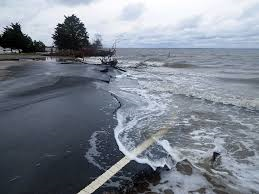CNN, without providing any critical analysis, cited a government employee claiming the sea level will likely rise between two and four feet during the next 80 years. The scientific evidence, however, shows such an increase is extremely unlikely.
This CNN article highlights one of the reasons even mainstream climate alarmists are calling on the media to stop claiming unrealistic and overly alarmist climate predictions are a likely scenario.
In a January 30 article titled “Building Projects in New Jersey Will Now Have to Account for Climate Change,” CNN cited National Oceanic and Atmospheric Administration scientist William Sweet making the alarmist sea-level claim. However, NOAA’s own data show sea level is rising at an average pace of merely 1.40 feet per 100 years — or 1.12 feet per 80 years — at New Jersey tidal gauges.
In other words, the pace of New Jersey sea-level rise would need to immediately double its pace, and maintain that higher pace for all of the next 80 years to meet even the low end of Sweet’s predicted range of sea-level rise.
Global and New Jersey sea-level data show the pace of sea-level rise has been relatively constant, with little, if any, increase in recent decades. NOAA’s New Jersey tidal gauges show no increasing pace at all.
So, by what logic is Sweet projecting an immediate and perpetual doubling or tripling of the pace of New Jersey sea-level rise? Neither Sweet nor CNN provide an explanation.
By choosing to quote “William Sweet, an oceanographer with the National Oceanic and Atmospheric Administration,” CNN suggests that Sweet’s status as a NOAA scientist ends all inquiry as to whether Sweet’s prediction is likely to be accurate. However, CNN could just as easily have quoted NOAA scientist Stanley Goldenberg, who would likely have presented a much less alarming analysis.
Goldenberg’s projection would be particularly noteworthy given that he specializes in hurricanes and hurricane impacts, while the impetus for the New Jersey building projects highlighted in the CNN article is the feared impacts of coastal vulnerability to tropical storms.
Goldenberg has convincingly debunked notions of worsening hurricane activity and alarming sea-level rise. He is just as much a NOAA scientist as Sweet. At worst, CNN should have presented analysis from both NOAA scientists, while noting the consistent, very modest pace of New Jersey sea-level rise.
Coincidentally to the alarmist CNN article, two prominent mainstream scientists who largely agree with U.N. climate predictions published a paper in January 2020 criticizing the media and some alarmist scientists for presenting far-fetched climate scenarios as likely outcomes.
“We must all — from physical scientists and climate-impact modelers to communicators and policymakers — stop presenting the worst-case scenario as the most likely one,” the scientists wrote. “Overstating the likelihood of extreme climate impacts can make mitigation seem harder than it actually is.”
The scientists’ admonition seems to perfectly apply to the alarmist New Jersey sea-level prediction presented by CNN and Sweet.

